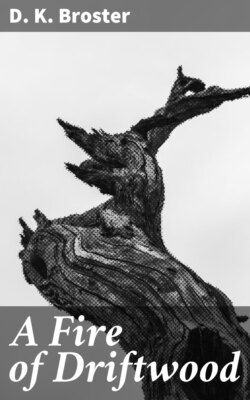Читать книгу A Fire of Driftwood - D. K. Broster - Страница 10
На сайте Литреса книга снята с продажи.
I
ОглавлениеTable of Contents
Ramparts fence about the fields of Brittany—banks of six feet high, crowned not with a hedge, but with a serried wall of forest trees, impassable to an enemy when defenders use it for cover. And on an evening in the early June of 1795, just after the snapping of the uneasy truce of La Mabilais, a score of Chouans stood, scrambled, climbed, and knelt upon a stockade of this description, firing at an unseen foe whose bullets sang through the leaves or thudded into the bank. Bretons all, in loose breeches and gaiters, in the short jackets—black, blue and yellow, or white—each with its double rank of buttons and the Sacred Heart, with long hair and stern harsh features, they gave to the business in hand nothing, indeed, of the mechanical regularity of veteran troops, but all of their sangfroid. One alone, on his knees at the top of the bank, who wore a white scarf round his waist, paused occasionally between firing and reloading and, peering through the tree-trunks, shouted a direction or two; while, a few steps away from the bank, an old man of gigantic stature, kneeling on one knee, wrestled with the lock of his damaged musket. A grim smile was on his face, for a sudden gush of bright chestnut leaves, trickling from aloft, had just shown him how high the slackening Republican fire was becoming. The hot three-quarters of an hour was approaching its end. He ceased for a moment to struggle with his weapon and ran his eye along the row of absorbed backs in front of him. The smoke of their own last volley was lifting; would it be answered? ...
A sharp and venomous discharge split the silence. The old man dropped his musket and sprang to his feet. “Seigneur Dieu! He is hit!”
The young Breton with the white scarf, suddenly carrying both hands quickly to his head, had toppled backwards, and now, slipping heavily from the summit of the bank, rolled over till he lay on his face at its foot.
The old giant had pounced on him almost before the marksmen next their leader had realised his fall.
“Ma Doué! don’t stop firing!” he shouted. “It is nothing—a spent bullet. Jean-Marie, you can come—no one else.”
And, picking up his young commander, he carried him to a little distance, and laid him down among the broom, his face a tragic mask of tenderness and anxiety.
“Hervé! Hervé! my little one ... it is not possible. ... Here, Jean-Marie, give me something to tie up his head.”
“It is no good,” said the other man in a horror-stricken whisper. “It is the end—he has a bullet through his brain for sure.”
“I tell you no,” responded his elder angrily, but in a breaking voice. “It is only that there is so much blood....”
And hurriedly, with trembling hands, he tried to staunch the stream pouring from some disastrous source in the dark hair. Meanwhile it spoke many things for the discipline of guerrilla troops devotedly attached to their leader that not a single Chouan had left his post at the hedge to allay his anxiety. The Breton marksmen were firing furiously and revengefully; only now and again would one turn his head over his shoulder and snatch a look at the little group behind him.
“God have mercy on us!” exclaimed the old man at last. “It is impossible to tell. I must get him away.... Undo his sash, Jean-Marie, that will serve.”
Jean-Marie did as he was bid, and together they tied the silk tightly round the bleeding head, with a handful of moss for a pad.
“Now,” said the old man, “go back to your place, Jean-Marie, and see that no one stirs from the bank till the Blues draw off. It is only a question of time. And as for M. Hervé—ask them if they think that l’Invincible can be killed by a mere bullet?”
“You will take him—where?”
“Chez nous. Do not ask me if I can carry him, nephew!” added the old man, with a fierce gleam in his extraordinarily blue eyes. “You will come back when it is all over—or I shall meet you with the saints. Now to your place!” He waved an imperious hand at the bank, and Jean-Marie ran back.
Then Yves le Guerric, murmuring in one breath curses, prayers and little words of love, gathered up his wounded foster-son and leader like a child, and strode off through the broom. He carried in his strong old arms most of his heart, and the brilliant fighter who was the hope of the Royalist cause between Pontivy and Quimperlé—the Comte Hervé de St-Armel, called l’Invincible.
| [1] | The latter part of this story is based on historical fact. |
